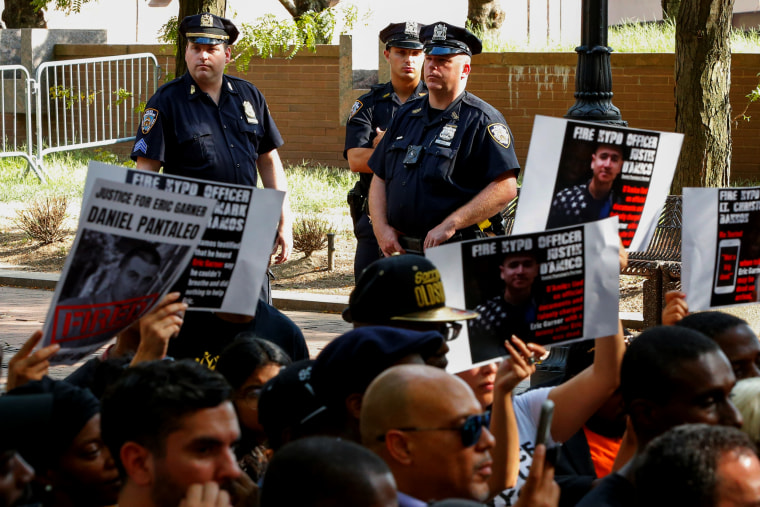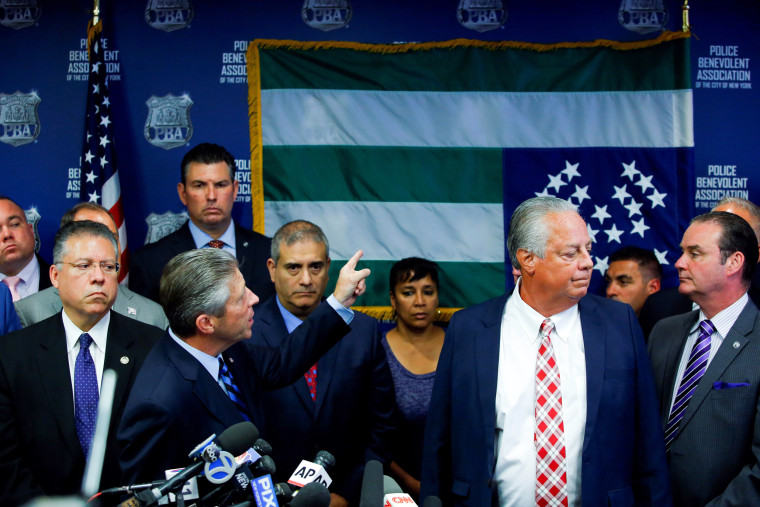The dismissal of the New York City police officer whose chokehold contributed to the 2014 death of Eric Garner was met with forceful rebuke from the police union's top leader, who sent a strong message to its 24,000 rank-and-file members.
"We are urging all New York City police officers to proceed with the utmost caution in this new reality, in which they may be deemed 'reckless' just for doing their job," Patrick Lynch, the longtime president of the Police Benevolent Association, said Monday after veteran Officer Daniel Pantaleo was fired.
"We will uphold our oath, but we cannot and will not do so by needlessly jeopardizing our careers or personal safety," he added.
It was a warning to the public as well, criminologists say, with Lynch alluding to the "Ferguson effect" argument, in which police pull back on acting, leading to a work slowdown because of criticism or administrative decisions perceived to endanger their well being on the streets.
Last month, another New York police union, the Sergeants Benevolent Association, tweeted a news report that two police officers had to stand stoically as a subway rider berated them: "PANTALEO AFFECT once again. Incidents like this are becoming an epidemic in the NYPD, why?"

But any suggestion that crime will spike as a result of officers' being more selective in how they respond isn't borne out in recent data, said Richard Rosenfeld, a criminologist at the University of Missouri-St. Louis.
"My sense is that, if the NYPD pulls back at all, it will be temporary and have little to no effect on NYC crime rates," he said.
Rosenfeld co-wrote a report in March in the journal Criminology & Public Policy that examined arrest and homicide rates from 2010 to 2015 in 53 large U.S. cities, including New York, Chicago and Los Angeles. It was in 2015 that U.S. homicide rates rose suddenly after falling for more than two decades.
The year before, the fatal shooting of Michael Brown, an unarmed 18-year-old black man, in Ferguson, Missouri, by police set off nationwide protests and calls for accountability. While a grand jury declined to indict the officer involved, Darren Wilson, who said he feared for his life when he shot Brown, he later resigned from the department.
Fears that other officers could face similar repercussions on the job reverberated in police departments and law enforcement agencies throughout the country.
Sam Dotson, the St. Louis police chief from 2012 to 2017, coined it "the Ferguson effect," saying "the criminal element is feeling empowered."
Rahm Emanuel, who was the mayor of Chicago when murders in the city climbed 12.5 percent from 2014 to 2015, reportedly told Attorney General Loretta Lynch in 2015 that "we have allowed our police department to get fetal and it is having a direct consequence. They have pulled back from the ability to interdict. … They don't want to be a news story themselves, they don't want their career ended early, and it's having an impact."
In his report, Rosenfeld said, the idea of "de-policing was the first and is still the favored account for why homicide rates" increased. But few studies have thoroughly examined the issue, and there is "little evidence" that crime increases when police pull back, he added.
His report "found no association between reduced rates of arrest and elevated rates of homicide," and "whatever sparked the 2015 homicide rise, it was not a reduction in arrest rates in large U.S. city police agencies."
Other police officials have been skeptical of the Ferguson effect.
Former Milwaukee Police Chief Edward Flynn told Reuters in 2016 that he viewed his city's rise in violent crime as more likely attributable to health service cuts and a new state law allowing people to carry concealed weapons.
Last year, New York City was one of the safest big cities in the nation, with the overall murder and violent crime rates decreasing, continuing a nearly three-decadelong trend, according to the NYPD. The New York Daily News reported last month that the city of 8.6 million is on track to see its lowest number of homicides since the 1950s, although shootings increased 7 percent in the first half of 2019 compared with the same period in 2018.
Observers say this positive trend isn't the result of police cracking down more heavily in recent years.
If anything, the NYPD has "deliberately been seeking to do less low-level enforcement, fewer stops, fewer frisks, arrest fewer people, replace arrests with tickets and citations, and as any good agency always does, minimize use of force," said David Kennedy, a professor at John Jay College of Criminal Justice and director of the National Network for Safe Communities, which seeks to reduce violence and strengthen trust with police.
The NYPD has "been quite successful on doing that," Kennedy said.
The police union has had a fraught relationship with the city's leadership before. In 2014, officers began turning their backs on Mayor Bill de Blasio in protest after the deadly shooting of two officers as they sat in their patrol car.

At the time, Lynch blasted de Blasio for the killings, after the gunman, in statements on social media, said that he was angered by the Garner and Brown cases.
But despite the tension between police and City Hall, "officers continued to do their jobs and violence in the city continued to go down," Kennedy said.
He added that the firing of the police officer in Garner's death is meant to show that the city will hold officers accountable — and that's a good thing for those officers who are striving to improve the communities they serve and build better relationships with residents.
Leadership is "very aware of the harm that bad policing can do, especially in distressed communities," Kennedy said.
